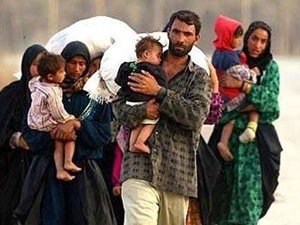Internal Displacement Tied to Kurdish Problem
"The establishment pursues an open dialogue with the international community while refraining from naming the problem inside".
From denial to partial dialogue
Titled "Internal Displacement in Turkey and Abroad: International Principles, Experiences and Policy Proposals", the symposium brings together academics, experts and practitioners who work on internal displacement as well as public officials from Turkey.
Ayata noted that the problem of displacement Turkish establishment has gone from denial to dialogue but this process brought together constraints as well as positive approaches.
Linked to the Kurdish problem
She emphasized that this problem can't be analyzed in Turkey without taking into account the Kurdish problem asking "Is this a phenomena that individuals face or does it effect particular communities".
Defining displacement as the state's failure to protect its citizens, Ayata said, "This failure doesn't stem from an 'administrative crises' as told in the international arena. This is a direct result of assimilation policies driven by the state itself".
"The establishment didn't stop by denying the displacement; it turned the problem into an economically and socially motivated migration. We've to ask how and why Kurds are displaced".
"Therefore Kurds in Turkey deserve an apology and a home" said Ayata, adding that it's not shelter that she means by a "home" but "a home where one can live in equality, as equal citizens".
And she pointed to the solution saying "A dialogue process has begun but it's not enough. The solution will come from the inside and for this, the internally displaced should get organized".
The plight of Palestinians
Working on Palestinian refugees and displaced persons, the stories of Karine MacAllister of the Badil Legal Support Unit resembled very much the ones in Turkey suffer.
MacAllister noted that the Palestinians' plight which began on 1947-49 still continues: "Palestine is getting smaller and smaller while the displacement gets bigger. The problem is a problem of control over the land. The displacement of the Palestinians is a result of the Israeli policies of population transfers".
She told that there are 8 million refugees and 400 thousand internally displaced Palestinians and went on to summarize the current situation as follows:
* Since 1947, the homes and lands of Palestinians are confiscated.
* Palestinians living in the West Bank carry a Jordanian passport and a "West Bank" ID but they have no citizens' rights whatsoever.
* There are 57 thousand internally displaced persons living in the Occupied Palestinian Territories but they aren't recognized beyond UN aids.
* There are 250-300 thousand internally displaced Palestinians living in Israel. They don't receive protection nor support. But there's a change. They began forming their own organizations and fighting for their rights. Hope rests in their own struggle. They should get organized.(TK/EÜ)
KURDISH QUESTION
PKK Ceasefire to be Terminated on 31 October?

KCK CASE
Court Dismissed Request for Defence in Kurdish

7th Istanbul Gathering for Freedom of Thought

CONSTITUTIONAL AMENDMENTS
58 Percent Said "Yes" to Constitutional Reform Package

Rights Organizations 3 Years ahead of Foreign Minister






